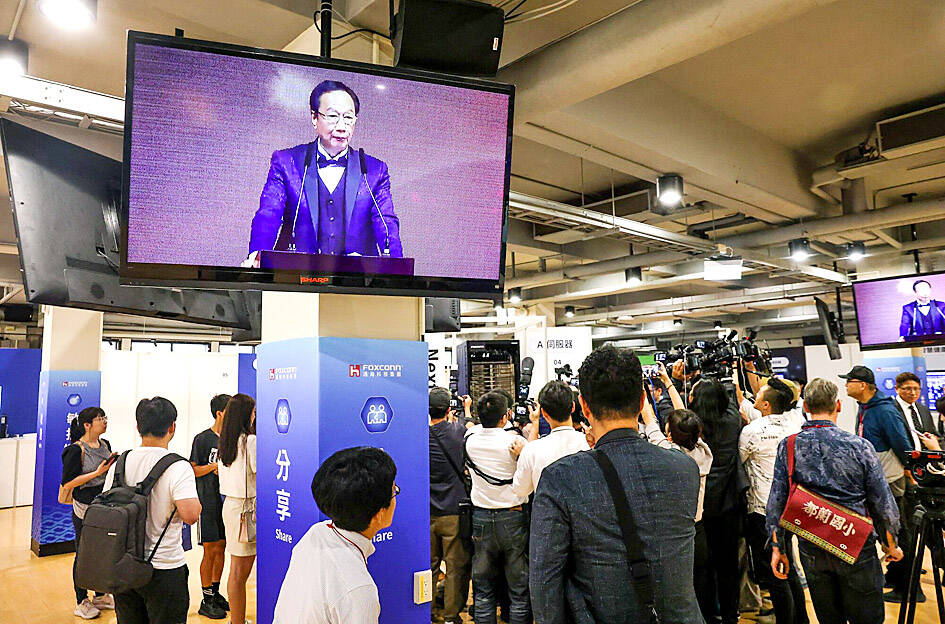Terry Gou (郭台銘), the billionaire founder of iPhone assembler Hon Hai Precision Industry Co (鴻海精密), has finally reached a goal that had eluded him for about eight years.
Shares of Hon Hai, known as Foxconn Technology Group (富士康科技集團) internationally, on Monday closed at NT$200, a level Gou had pledged to achieve in 2016.
The Taipei-listed stock retreated 0.75 percent to close at NT$198.5 on a mild technical pullback yesterday, but it has surged 91.39 percent this year on investor enthusiasm for artificial intelligence (AI) servers and the potential of the latest Apple Inc products.

Photo: Bloomberg
While Gou stepped down as Hon Hai chairman in 2019 to unsuccessfully pursue Taiwan’s presidency, the price represents a landmark for the firm he started 50 years ago.
Annual general meetings in past years had featured shareholders asking Gou when his famous target would be attained. This year’s meeting demonstrated how the company has evolved in new fields including AI servers, which it expects to become its next NT$1 trillion (US$30.87 billion) business, and electric vehicles.
The robust performance this year of Hon Hai and Taiwanese tech peers also underscores the transformation of the country’s contract manufacturers from low-margin, commodity information technology products to higher value-added offerings.
“The AI wave lifts all boats,” said Xiadong Bao, a fund manager at Edmond de Rothschild Asset Management.
For Hon Hai, “the rally is mainly driven by the AI server ramp-up, further expansion into AI-related networking equipment and high expectations for a general server and PC recovery,” he said.
Hon Hai reported that its revenue last month grew 22 percent year-on-year to a record high for the May, and said it is likely to beat expectations for the second quarter, due to stronger-than-expected demand for AI servers.
Hon Hai’s dip in shares yesterday, pared a rally that has shown some signs of overheating. Hon Hai is trading at a record high valuation of 16 times estimated forward earnings compared with its five-year average of 10 times.
However, Bloomberg Intelligence analyst Steven Tseng (曾緒良) sees potential for the stock to keep climbing above NT$200.
There was a “turning point” in March for Hon Hai, with the market realizing its relationship with Nvidia Corp and importance in the AI supply chain, Tseng said.

Taiwan Semiconductor Manufacturing Co (TSMC, 台積電) would not produce its most advanced technologies in the US next year, Minister of Economic Affairs J.W. Kuo (郭智輝) said yesterday. Kuo made the comment during an appearance at the legislature, hours after the chipmaker announced that it would invest an additional US$100 billion to expand its manufacturing operations in the US. Asked by Taiwan People’s Party Legislator-at-large Chang Chi-kai (張啟楷) if TSMC would allow its most advanced technologies, the yet-to-be-released 2-nanometer and 1.6-nanometer processes, to go to the US in the near term, Kuo denied it. TSMC recently opened its first US factory, which produces 4-nanometer

GREAT SUCCESS: Republican Senator Todd Young expressed surprise at Trump’s comments and said he expects the administration to keep the program running US lawmakers who helped secure billions of dollars in subsidies for domestic semiconductor manufacturing rejected US President Donald Trump’s call to revoke the 2022 CHIPS and Science Act, signaling that any repeal effort in the US Congress would fall short. US Senate Minority Leader Chuck Schumer, who negotiated the law, on Wednesday said that Trump’s demand would fail, while a top Republican proponent, US Senator Todd Young, expressed surprise at the president’s comments and said he expects the administration to keep the program running. The CHIPS Act is “essential for America leading the world in tech, leading the world in AI [artificial

REACTIONS: While most analysts were positive about TSMC’s investment, one said the US expansion could disrupt the company’s supply-demand balance Taiwan Semiconductor Manufacturing Co’s (TSMC, 台積電) new US$100 billion investment in the US would exert a positive effect on the chipmaker’s revenue in the medium term on the back of booming artificial intelligence (AI) chip demand from US chip designers, an International Data Corp (IDC) analyst said yesterday. “This is good for TSMC in terms of business expansion, as its major clients for advanced chips are US chip designers,” IDC senior semiconductor research manager Galen Zeng (曾冠瑋) said by telephone yesterday. “Besides, those US companies all consider supply chain resilience a business imperative,” Zeng said. That meant local supply would

BIG INVESTMENT: Hon Hai is building the world’s largest assembly plant for servers based on Nvidia Corp’s state-of-the-art AI chips, Jalisco Governor Pablo Lemus said The construction of Hon Hai Precision Industry Co’s (鴻海精密) massive artificial intelligence (AI) server plant near Guadalajara, Mexico, would be completed in a year despite the threat of new tariffs from US President Donald Trump, Jalisco Governor Pablo Lemus said. Hon Hai, also known as Foxconn Technology Group (富士康科技集團), is investing about US$900 million in what would become the world’s largest assembly plant for servers based on Nvidia Corp’s state-of-the-art GB200 AI chips, Lemus said. The project consists of two phases: the expansion of an existing Hon Hai facility in the municipality of El Salto, and the construction of a